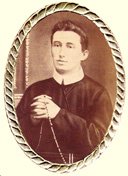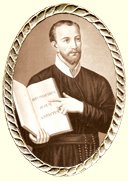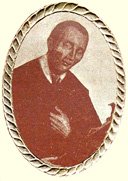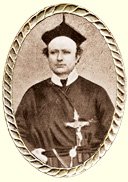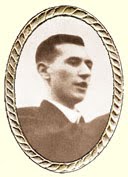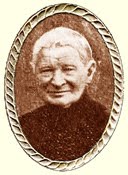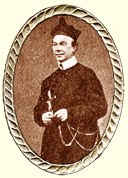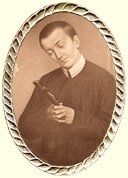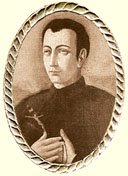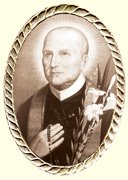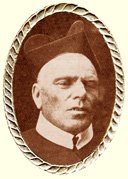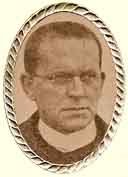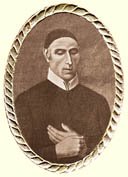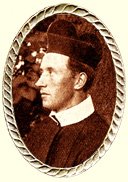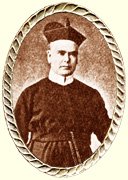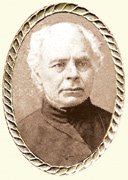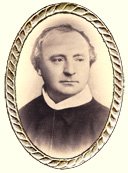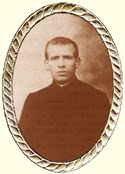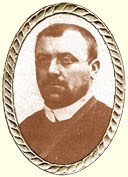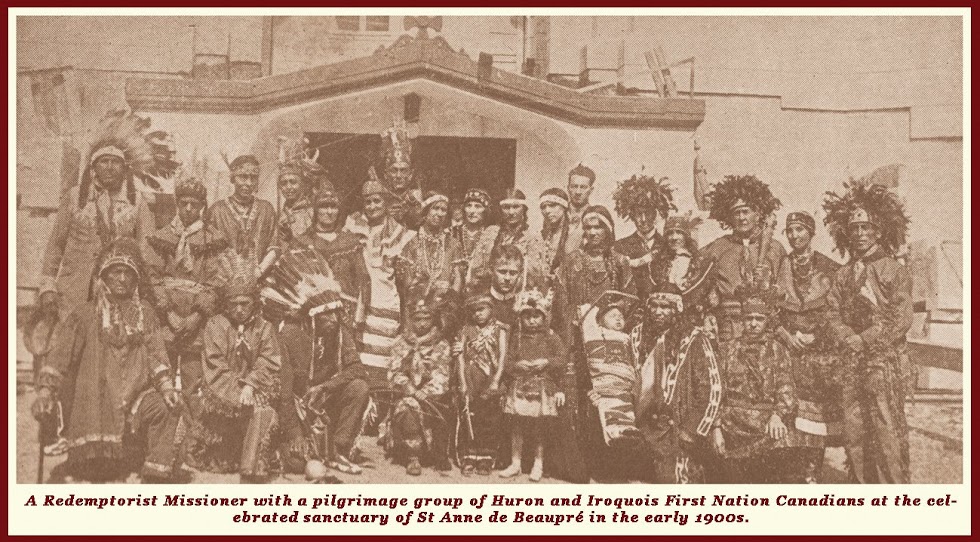Fr. Hampl was born on May 28th 1814, in Luditz, a city in German – Bohemia (Eger District). He studied grammar at the Piarist School, finished Secondary School with the Praemonstratensians in Saaz, Germany, and then entered the University of Prague where he attended Philosophy lectures for one year. Since he did not pass the examination at the end of the year, he was expected to repeat the course.
However, he was not willing to do that. Therefore he set out on foot from Prague to Freiburg in Switzerland, where he arrived on May 26th 1833, and asked to enter the Redemptorist Congregation. By good fortune the Rector of the House, Fr. Czech, was also a Bohemian. Fr. Czech cordially received the young student, whose academic records and outward appearances did not recommend him very much nor did his outspoken attitudes. But Fr. Czech did offer him admission, and Fr. Czech never had to regret his decision. The indolent philosopher soon became one of the most eager students, and a beloved son of the Prefect of Students, Fr. Neubert.
Until Autumn of that year Fr. Hampl attended lectures in physics and philosophy at the Jesuit College in Freiburg. His clothing ceremony was on October 28th 1833, and he remained at the Noviciate until April 24th 1834. Then, because of the persisting dissention between the Austrian and Swiss governments, the Superiors thought the best course would be to send him to Austria into the Noviciate in Weinhaus near Vienna. After a completed Noviciate he was sent to the University in Vienna to study for another year because the courses he took in a foreign country were not acknowledged at that time in Austria. His records were recognised only as a temporary identification card. Then in Autumn of 1835 he came to the Mautern monastery, made his Profession of Vows there on March 18th 1836, and was ordained a Priest on July 28th 1838.
After he was Socius to the Novice Master for a year in Eggensburg (Austria), he returned to Vienna where he was assigned as a preacher in the Redemptorist Church as well as to minor apostolic occupations. In March, 1841, he was appointed to Modena, Italy, and departed for that city, but went only as far as Innsbruck, where another order overtook him: do not go to Modena, but to Altoetting, Bavaria, where a new House had been founded.
In the following year he became involved with the Missions so that he could take part in prospective Missions in Bavaria with Altoetting as his base. The only exception was the short time he spent in Innsbruck and Vilsbiburg (Bavaria). After 1848 his missionary activity extended beyond Bavaria. As a Mission Superior on the Rhine, in Silesia, Wuerttemberg, Upper and Lower Austria, as well as in Bohemia, he displayed a wonderful effectiveness.
Everywhere Fr. Hampl went he was one of the most beloved Missionaries. He was a truly popular speaker. He did not sweep away the congregation with lofty, enthusiastic presentations, but by graphic comparisons, gripping examples, and practical applications in life. He made deep impressions on his listeners by arresting their attention. His style of speech was popular and noble; his delivery was vigorous and unaffected. All of his sermons were very carefully written. He didn’t hesitate to spend 3-4 weeks and sometimes longer on the preparation of one Mission sermon, especially one teaching dogma. With the greatest diligence everything from beginning to end was written down, and given for the most part word for word. Every sentence and every word was carefully chosen. No wonder that his sermons remained deeply fixed in the hearts and memories of the audience. An example of this is that a Brother could still repeat to this writer the main part of one of Fr. Hampl’s sermons 40 years after the Brother had heard it.
One was not inclined to believe that Fr. Hampl considered himself suitable to be a Local Superior because of his cheerful, droll frame of mind that he always showed around his confreres. But experience proved exactly the opposite. In 1854 he was named Rector of Bornhofen (Schleswig), and satisfied the trust of his Superiors’ to such a high degree that he was retained in that office for seven years. Then he was entrusted (Oct. 1861) with the office of Rector of Maria Hamicolt (Diocese of Muenster), and as the student advisor in academic respects. Then in April 1862 he became Provincial of the Lower German province, which office he filed laudably for 9 years until 1871.
In the Autumn of 1850 at the pilgrimage place of Bornhofen a branch of the order was founded. It was expected to strengthen and continue the splendid work begun in the preceding Spring in the Diocese of Limburg in Germany. The Superiors, however, were not in the position to fill the Bornhofen House with a sufficient number of Missionaries as there were few subjects at their disposal. The hopes of Bishop Peter Joseph Blum, who was very eager for souls, were not fulfilled in the first three years. In order to satisfy the Bishop’s justified challenge to some extent; Fr. Hampl was transferred from Altoetting to Bornhofen and named Rector of that House.
He understood how to remedy the sad state of affairs at the House in every way. Since he was already known as an excellent Missionary, a number of Missions were requested by parish priests and were held with great success. Furthermore, Fr. Hampl made every effort to train the young priests, who hitherto had received no comprehensive instruction in preaching. Through guidance and example he taught them to become eager missionaries. Fr. Hampl knew how to command respect by his valiant character and candid appearance as well as by his extensive knowledge in every social situation without damaging religious moderation and humility. He was listened to readily at Missions, but also at Spiritual exercises, which he held for priests and cloistered nuns at various locations.
In conversation with people of all social classes he understood how to act in a natural but still very dignified manner. In this way he won the trust of high-ranking clergy and also of the laity. The dethroned King of Portugal, Don Miguel, greeted Fr. Hampl after the Mission in Heubach (Wuerttemberg) in a very gracious way. The Countess Hahn-Hahn came to Bornhofen for several days every year to take part in religious exercises under Fr. Hampl’s guidance, and in one of letters she did not think it unworthy of her rank to describe her stay in Bornhofen to present and future generations.
Fr. Hampl also succeeded in improving the material conditions of the Bornhofen House during his years as Rector by prudent saving, but also by setting up ornamental gardens and planting a number of the best fruit trees, which gave the House a more beautiful exterior appearance. Fr. Hampl had proved himself to be an efficient Superior in every respect in Bornhofen, and later on also for a short time in Maria Hamicolt. Then in 1862 he was assigned to an even more important office as Provincial of the Lower German Province.
What qualified Fr. Hampl in particular for this office was his great love for the Redemptorist Congregation to which he had given himself from his early youth. He had absorbed the unalloyed essence of the Congregation in Freiburg and Vienna through acquaintance with the pupils of the late
St Clement Hofbauer. Therefore in conversation and in his conferences he referred with special priority to these old Redemptorists: Frs. Czech, Neubert, Schoellhorn, Passerat, etc.

He cited examples of them, namely their zeal for souls, their mortification, their poverty, and other characteristics like these, as well as the miraculous advancement the Congregation experienced since those times.
Fr. Hampl often used to tell of the saintly Fr. Heinzl, his former Rector in Mautern, who displayed all sorts of edifying character traits. Fr. Hampl also told of Fr. Heinzl’s three fondest wishes, which had been completely fulfilled:
1. To be allowed to honour the late Alphonsus de Liguori as a saint.
2. That at least 50 Fathers would be active this side of the Alps.
3. That he would see the Congregation spread also into America.
Fr.Hampl gave great importance to the general well-being of the Congregation. One day when he heard of an unhappy misunderstanding in one of the Provinces, he expressed himself in these words: -
‘I would gladly give one of my fingers if that would remedy this grievance.’
By his unremitting efforts he succeeded in improving the material situation of the Province to a considerable degree. In particular, he rendered outstanding service concerning the defrayal of charges to the students at all times. And he did this with great self-denial in that he economised on his travels in every possible way, and went short of bread, so to speak, in order to spend less on himself. With great effort he showed distinct proof of his love for the Congregation by collecting all the relevant reports from the Bornhofen Monastery into a chronicle. Also with bee-like diligence he set up a day to day Provincial Chronicle, which consisted of approximately one thousand closely written pages in the ledger, and which went up the year 1871.
As Superior he was very considerate towards his subordinates. He understood how to show great patience with the weakness of others, and, if a correction was necessary, to delay rectification until a suitable opportunity. Then he would give his opinion frankly and candidly so that everyone understood what was expected of him.
After Fr. Hampl had held his offices as Provincial for nine years with great self-sacrifice and astuteness, he was relieved of this heavy burden in 1871. The two following years he spent in Trier as a Minister and Provincial Advisor until he was exiled from the German Empire in 1873, and so returned to his homeland, Austria, where he spent his last days, in the Leoben House. Repeated attacks of apoplexy had broken his mental and physical strength. The suppression of the monasteries in the Rhineland and Westphalia where he had worked so long, depressed him to such an extent that his earlier bright frame of mind never again revived.
New attacks weakened his mind even more, until in 1875 a severe stroke almost reduced him to an infantile state. He received the Last Sacraments and died soon afterwards on March 1st 1875. May he rest in peace. †

























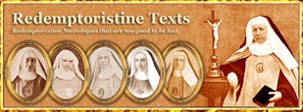
.jpg)









